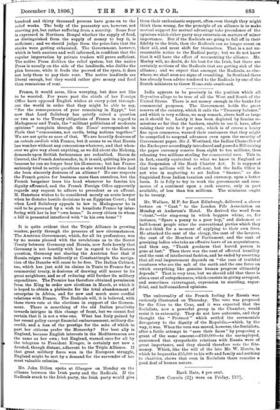France, it would seem, likes worrying, but does not like
to be worried. For years past the chiefs of her Foreign Office have opposed English wishes at every point through- out the world in order that they might be able to say, " See the consequences of your remaining in Egypt," but now that Lord Salisbury has quietly raised a question or two as to the Treaty obligations of France in regard to Madagascar and Tunis, the "militant politicians of moderate opinions" complain through the Times' correspondent in -Paris that "concessions, not cavils, bring nations together." We are not quite so sure of that. We are heartily desirous of an entente cordiale with France, but it seems to us that Russia 'has won her without any concessions whatever, and that when- ever we give way about anything, as we did about the Mekong, demands upon British forbearance are redoubled. Baron de Courcel, the French Ambassador, is, it is said, quitting his post because he can no longer bear his ill-success ; but has France seriously tried to settle questions as she would have done had she been sincerely desirous of an alliance? No one respects the French genius for business more than ourselves, but the French bargainer loses his head whenever he fancies his dignity affronted, and the French Foreign Office apparently regards any request to adhere to precedent as an affront. M. Hanotaux wishes to be considered merely an acute lawyer when he dictates hostile decisions to an Egyptian Court ; but when Lord Salisbury appeals to law in Madagascar he is said to be governed by a wish to humiliate France by inter- fering with her in her "own home." Is every citizen to whom a bill is presented interfered with "in his own home"?










































 Previous page
Previous page